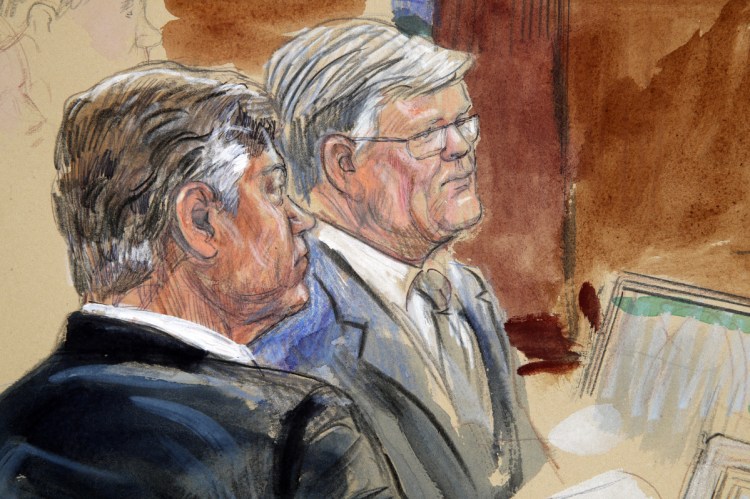ALEXANDRIA, Va. – After three days of dramatic and even salacious testimony in the trial of Paul Manafort, prosecutors on Thursday returned to the nuts and bolts of their case against the former Trump campaign chairman as they sought to show he obtained millions of dollars in bank loans under false pretenses.
Attorneys for special counsel Robert Mueller also got a rare – and narrow – acknowledgment from U.S. District Judge T.S. Ellis III that he likely erred when he angrily confronted them a day earlier over whether he had allowed a witness to watch the trial.
The judge’s comments and detailed testimony about Manafort’s loans came during the eighth day of his trial as prosecutors began presenting the bulk of their bank fraud case against him after spending days largely on tax-evasion allegations. Prosecutors say they expect to rest their case Friday.
On Thursday, a series of bank employees told jurors about discrepancies and outright falsehoods contained on Manafort’s applications for millions of dollars in loans.
Melinda James, a Citizens Bank mortgage loan assistant, testified that Manafort had told the bank that a New York City property would be used as a second residence, but she found it listed as a rental on a real estate website. That distinction matters because banks regard loans for investment properties as riskier and impose restrictions, including on how much money they’re willing to lend.
Jurors saw an email from Manafort to his son-in-law, Jeffrey Yohai, in which he advises him that an appraiser is looking to schedule a visit to the property.
“Remember he believes that you and Jessica are living there,” Manafort wrote in the email, referencing his daughter. “Let me know when you have arranged it.”
Manafort also asserted he did not have a mortgage on a different New York property, even though he actually did, James said.
All the while, Manafort signed paperwork indicating he understood that he could face criminal or civil penalties if he lied to the bank.
Multiple bank officials said accurate information is essential for them as they decide whether to approve a loan.
“The underwriter needs a clear picture of all the debts, the monthly debts, of the borrower in order to make an accurate decision on the loan,” James said.
Airbnb executive Darin Evenson also told jurors that one of Manafort’s New York City properties was offered as a rental through much of 2015 and 2016 – a direct contradiction of the documents the longtime political consultant submitted to obtain a $3.4 million loan.
The prosecution has put forward more than 20 witnesses – including Manafort’s longtime deputy Rick Gates – and a trove of documentary evidence as they’ve sought to prove Manafort defrauded banks and concealed millions of dollars in offshore bank accounts from the IRS. But along the way they’ve not only faced an aggressive defense team, but a combative relationship with Ellis.
The judge has subjected the prosecution to repeated tongue-lashings over the pace of their questioning, their massive amount of trial exhibits and even their facial expressions. But on Thursday, Ellis told jurors he went overboard when he erupted at prosecutors for allowing an expert witness to remain in the courtroom during the trial.
“Put aside my criticism,” Ellis said, adding, “This robe doesn’t make me anything other than human.”
The judge’s comments were in response to a written filing by prosecutors arguing that Ellis should instruct the jury that he made an error in admonishing them during the Wednesday testimony of IRS agent Michael Welch.
Ellis had heatedly confronted prosecutor Uzo Asonye, saying he hadn’t authorized Welch to watch the entirety of the trial. Witnesses are usually excluded from watching unless allowed by the judge.
But in their filing, prosecutors attached a transcript showing that in fact Ellis had approved the request a week before. They said his outburst prejudiced the jury by suggesting they had acted improperly and could undermine Welch’s testimony.
Welch had told jurors that Manafort didn’t report at least $16 million on his tax returns between 2010 and 2014. He also said Manafort should have reported multiple foreign bank accounts to the IRS in those years.
Prosecutors had asked Ellis to instruct the jury that they hadn’t done anything improper in an attempt to repair any unfair prejudice.
On Thursday, they also asked Ellis to seal portions of a bench conversation that came during the testimony of Gates, Manafort’s longtime deputy, because “substantive evidence” in an ongoing investigation was discussed.
Prosecutors didn’t specify the nature of the information, but one bench conference came after Manafort’s defense team attempted to question Gates about whether he had discussed his work on the Trump campaign with Mueller’s team.
Neither Manafort nor Gates was charged in connection with their Trump campaign work, but the special counsel continues to investigate Russian election interference and any ties to associates of the president. Trump himself has closely watched Manafort’s trial as he continues to fume publicly about Mueller’s investigation.
Thursday’s testimony was devoid of some of the drama from the last few days, when Gates was confronted about having embezzled hundreds of thousands of dollars from Manafort and was forced to admit on the witness stand to an extramarital affair.
Send questions/comments to the editors.



Comments are no longer available on this story